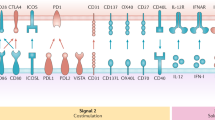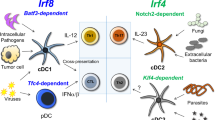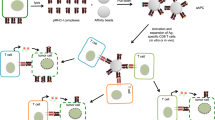Abstract
Despite the potency with which dendritic cells (DCs) are able to utilize the exogenous MHC I antigen cross-presentation pathway to cross-present antigen for the activation of killer T cells in model systems, concern about defects in immune function in cancer patients has led to uncertainty regarding whether immune cells derived from patients can effectively be used to generate tumor vaccines. We have undertaken a careful analysis of the potency of using DCs obtained from prostate cancer patients to cross-present antigen derived from human prostate tumor cells for the activation of antigen-specific T cells. Such DCs can be matured ex vivo into functionally active cells and are capable of cross-presenting influenza antigen derived from internalized apoptotic prostate tumor cells. Importantly, we demonstrate effective stimulation of both CD4+ and CD8+ T cells, as evident by production of IFN-γ, and the ability of CD8+ T cells to differentiate into effector CTLs. These results, defining conditions in which prostate cancer patient DCs can efficiently utilize the cross-presentation pathway and in which apoptotic tumor can serve as a source of antigen for DCs to activate T cells, demonstrate that this system warrants clinical study as a potential immunotherapy.
This is a preview of subscription content, access via your institution
Access options
Subscribe to this journal
Receive 4 print issues and online access
$259.00 per year
only $64.75 per issue
Buy this article
- Purchase on Springer Link
- Instant access to full article PDF
Prices may be subject to local taxes which are calculated during checkout





Similar content being viewed by others
References
Darnell RB . Onconeural antigens and the paraneoplastic neurologic disorders: at the intersection of cancer, immunity and the brain. Proc Natl Acad Sci USA (1996); 93: 4529–4536.
Albert ML, Sauter B, Bhardwaj N . Dendritic cells acquire antigen from apoptotic cells and induce class I- restricted CTLs. Nature (1998); 392: 86–89.
Albert ML et al. Tumor-specific killer cells in paraneoplastic cerebellar degeneration. Nat Med (1998); 4: 1321–1324.
Albert ML, Austin LM, Darnell RB . Detection and treatment of activated T cells in the cerebrospinal fluid of patients with paraneoplastic cerebellar degeneration. Ann Neurol (2000); 47: 9–17.
Inaba K et al. Efficient presentation of phagocytosed cellular fragments on the major histocompatibility complex class II products of dendritic cells. J Exp Med (1998); 188: 2163–2173.
Bevan MJ . Cross-priming for a secondary cytotoxic response to minor H antigens with H-2 congenic cells which do not cross-react in the cytotoxic assay. J Exp Med (1976); 143: 1283–1288.
Albert ML et al .In: Gordon S (ed). Uptake and presentation of phagocytosed antigens by dendritic cells, Phagocytosis and Pathogens. JAI Press: Greenwich, CI, Philadelphia 1999; pp 363–378.
Albert ML, Darnell RB . Paraneoplastic neurologic degenerations: keys to tumour immunity. Nat Cancer Rev (2003); 4: 36–44.
Albert ML, Jegathesan M, Darnell RB . Dendritic cell maturation is required for the cross-tolerization of CD8+ T cells. Nat Immunol (2001); 9: 1–8.
Li M et al. Cell-associated ovalbumin is cross-presented much more efficiently than soluble ovalbumin in vivo. J Immunol (2001); 166: 6099–6103.
Scardino PT, Weaver R, Hudson MA . Early detection of prostate cancer. Hum Pathol (1992); 23: 211–222.
Agus DB et al. Prostate cancer cell cycle regulators: response to androgen withdrawal and development of androgen independence. J Natl Cancer Inst (1999); 91: 1869–1876.
Narain V, Cher ML, Wood Jr DP . Prostate cancer diagnosis, staging and survival. Cancer Metastasis Rev (2002); 21: 17–27.
Banchereau J, Steinman RM . Dendritic cells and the control of immunity. Nature (1998); 392: 245–252.
Bhardwaj N . Processing and presentation of antigens by dendritic cells: implications for vaccines. Trends Mol Med (2001); 7: 388–394.
Tjoa B et al. Presentation of prostate tumor antigens by dendritic cells stimulates T- cell proliferation and cytotoxicity. Prostate (1996); 28: 65–69.
Small EJ et al. Immunotherapy of hormone-refractory prostate cancer with antigen-loaded dendritic cells. J Clin Oncol (2000); 18: 3894–3903.
Bender A et al. Improved methods for the generation of dendritic cells from nonproliferating progenitors in human blood. J Immunol Methods (1996); 196: 121–135.
Rieser C et al. Prostaglandin E2 and tumor necrosis factor alpha cooperate to activate human dendritic cells: synergistic activation of interleukin 12 production. J Exp Med (1997); 186: 1603–1608.
Albert ML et al. Immature dendritic cells phagocytose apoptotic cells via alphavbeta5 and CD36, and cross-present antigens to cytotoxic T lymphocytes. J Exp Med (1998); 188: 1359–1368.
Savill J . Phagocyte recognition of apoptotic cells. Biochem Soc Trans (1996); 24: 1065–1069.
Heiser A et al. Autologous dendritic cells transfected with prostate-specific antigen RNA stimulate CTL responses against metastatic prostate tumors. J Clin Invest (2002); 109: 409–417.
Lodge PA et al. Dendritic cell-based immunotherapy of prostate cancer: immune monitoring of a phase II clinical trial. Cancer Res (2000); 60: 829–833.
Geiger JD et al. Vaccination of pediatric solid tumor patients with tumor lysate-pulsed dendritic cells can expand specific T cells and mediate tumor regression. Cancer Res (2001); 61: 8513–8519.
Yang R, Xu D, Zhang A, Gruber A . Immature dendritic cells kill ovarian carcinoma cells by a FAS/FASL pathway, enabling them to sensitize tumor-specific CTLs. Int J Cancer (2001); 94: 407–413.
Kotera Y, Shimizu K, Mule JJ . Comparative analysis of necrotic and apoptotic tumor cells as a source of antigen(s) in dendritic cell-based immunization. Cancer Res (2001); 61: 8105–8109.
Fonteneau JF et al. Characterization of the MHC class I crosspresentation pathway for cell associated antigens by human dendritic cells. Blood (2003); 102: 4448–4455.
Scheffer SR et al. Apoptotic, but not necrotic, tumor cell vaccines induce a potent immune response in vivo. Int J Cancer (2003); 103: 205–211.
Albert ML, Bhardwaj N . Resurrecting the dead: dendritic cells acquire antigen from apoptotic cells. Immunologist (1998); 6: 194–198.
Bennett SR et al. Help for cytotoxic-T-cell responses is mediated by CD40 signalling. Nature (1998); 393: 478–480.
Salgaller ML et al. Report of immune monitoring of prostate cancer patients undergoing T-cell therapy using dendritic cells pulsed with HLA-A2-specific peptides from prostate-specific membrane antigen (PSMA). Prostate (1998); 35: 144–151.
Murphy G et al. Phase I clinical trial: T-cell therapy for prostate cancer using autologous dendritic cells pulsed with HLA-A0201-specific peptides from prostate-specific membrane antigen. Prostate (1996); 29: 371–380.
Nestle FO et al. Vaccination of melanoma patients with peptide- or tumor lysate-pulsed dendritic cells. Nat Med (1998); 4: 328–332.
Rosenberg SA et al. Immunologic and therapeutic evaluation of a synthetic peptide vaccine for the treatment of patients with metastatic melanoma. Nat Med (1998); 4: 321–327, (see comments).
Schadendorf D, Nestle FO . Autologous dendritic cells for treatment of advanced cancer–an update. Recent Results Cancer Res (2001); 158: 236–248.
Yee C et al. Melanocyte destruction after antigen-specific immunotherapy of melanoma: direct evidence of t cell-mediated vitiligo. J Exp Med (2000); 192: 1637–1644.
Ohnmacht GA et al. Short-term kinetics of tumor antigen expression in response to vaccination. J Immunol (2001); 167: 1809–1820.
Dawson DV et al. Ramifcations of HLA class I polymorphism and population genetics for vaccine development. Genet Epidemiol (2001); 20: 87–106.
Ridge JP, Di Rosa F, Matzinger P . A conditioned dendritic cell can be a temporal bridge between a CD4+ T-helper and a T-killer cell. Nature (1998); 393: 474–478.
Schoenberger SP et al. T-cell help for cytotoxic T lymphocytes is mediated by CD40-CD40L interactions. Nature (1998); 393: 480–483.
Acknowledgements
We thank members of the laboratory for helpful discussions and critical review of the manuscript, P Albert for patient referral, and the Rockefeller University Hospital staff for their expertise assisting our clinical studies. This work was supported by a Burroughs Wellcome Career Award in Biomedical Science, an NIH National Research Service Award, the National Cancer Center, and a Doris Duke Clinical Scientist Development Award (MLA), and the Howard Hughes Medical Institute, NIH RO1 CA85784 and CA093507, and a Burroughs Wellcome Fund Clinical Scientist Award in Translational Research (RBD). This research was supported in part by a General Clinical Research Center Grant (M01-RR00102) from the National Center for Research Resources at the National Institutes of Health. This manuscript is dedicated to Leslie Misrock.
Author information
Authors and Affiliations
Corresponding author
Rights and permissions
About this article
Cite this article
Orange, D., Jegathesan, M., Blachère, N. et al. Effective antigen cross-presentation by prostate cancer patients' dendritic cells: implications for prostate cancer immunotherapy. Prostate Cancer Prostatic Dis 7, 63–72 (2004). https://doi.org/10.1038/sj.pcan.4500694
Received:
Revised:
Accepted:
Published:
Issue Date:
DOI: https://doi.org/10.1038/sj.pcan.4500694
Keywords
This article is cited by
-
Dendritic cell vaccines containing lymphocytes produce improved immunogenicity in patients with cancer
Journal of Translational Medicine (2014)
-
Paraneoplastic neurological degenerations: keys to tumour immunity
Nature Reviews Cancer (2004)



